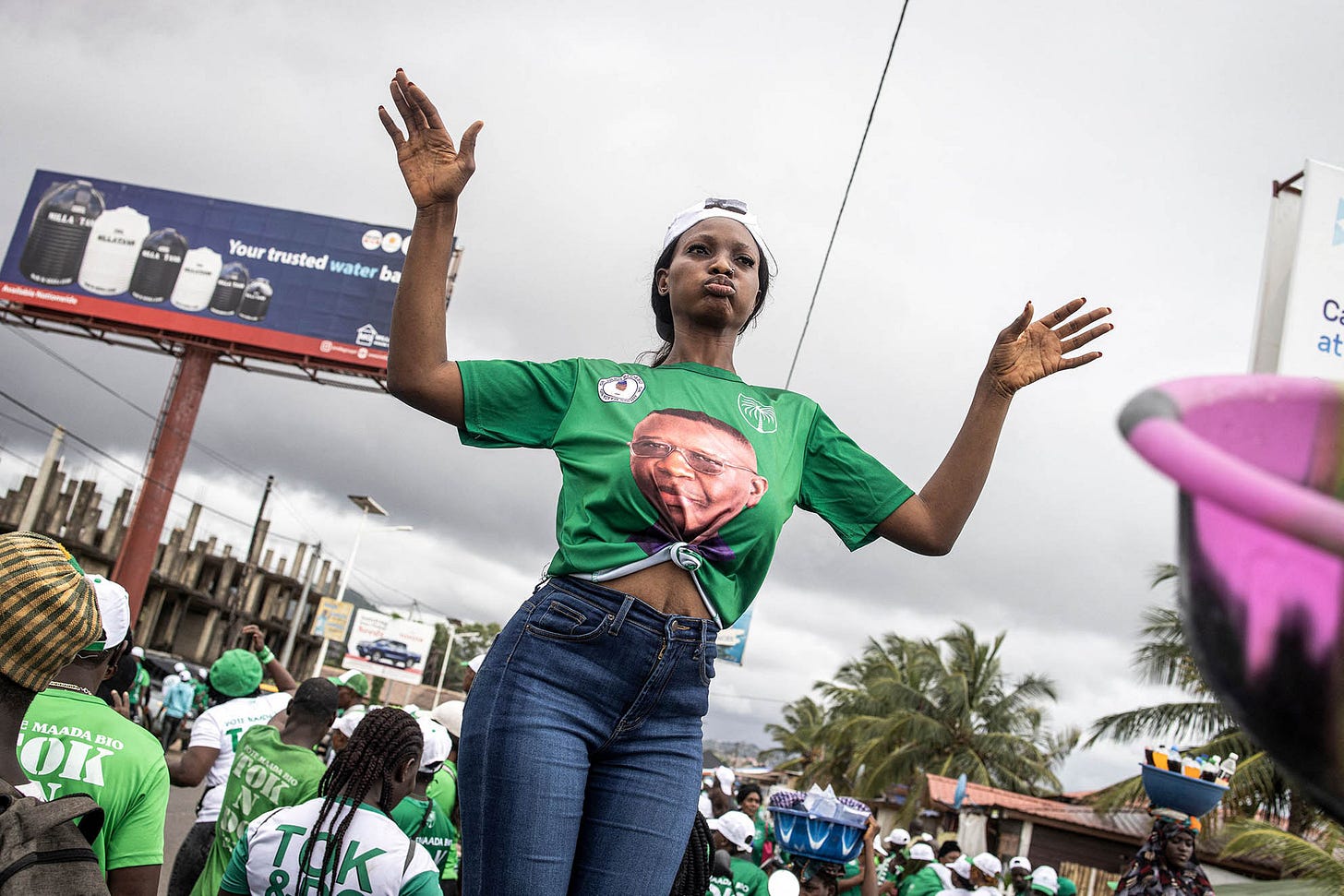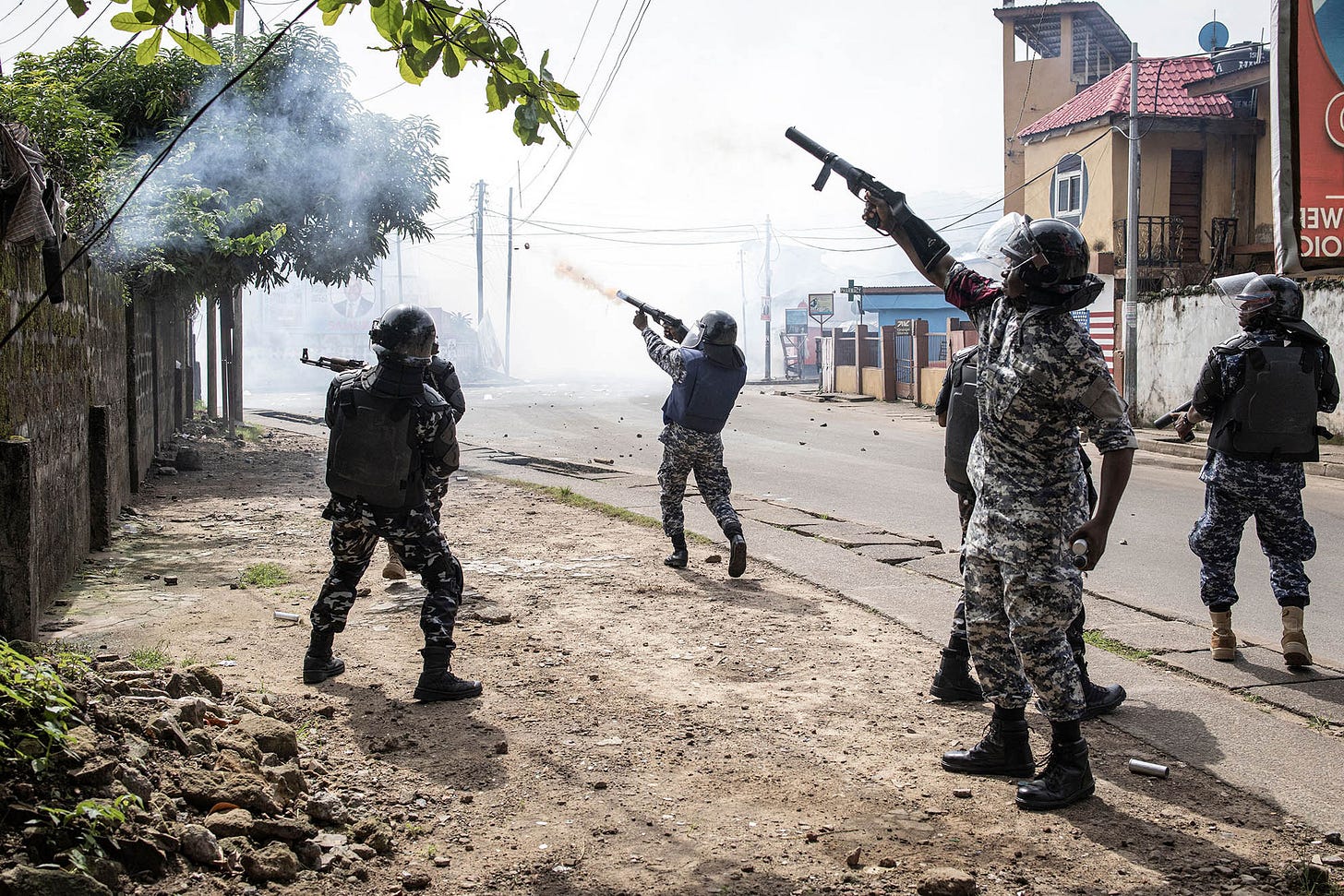Sierra Leone’s democratic delusions
Yes, there’s an election. No, nothing will change, writes novelist Ishmael Beah
12 June 2023. Freetown. In the early hours of the morning, a gathering of intoxicated supporters of the ruling Sierra Leone People’s Party dances along Kissy road in the east of the capital. Their free t-shirts – in the party’s green and white colours, emblazoned with party slogans – are already drenched with sweat. This is what political campaigning looks like in Sierra Leone: just enough free t-shirts and cash to get people drunk and dancing.
No debates or serious discussions about how to make life better in one of the world’s poorest countries.
As rain begins to fall, a few young men remove their t-shirts to reveal another free t-shirt underneath – this one in the red and white colours of the opposition. Some of the crowd frowned, but the young men quickly explain that this is not supposed to be a provocation. We dae with all man, we na multi party man dem — We are everyone, we are multi-party people.

And the dancing continues, because everyone knows it doesn’t really matter. We vote for a new president on Saturday, but the candidates are hard to distinguish in any meaningful way. The incumbent parades a masquerade of success, even as the economy disintegrates; while the opponent promises to fix everything, without a clear plan.
Usually, in the run-up to a competitive election, basic services improve: the power stays on, the water keeps running, the government pays its workers on time. But none of this is happening. We go for days without electricity we have already paid for, and that is in the nicer parts of the city. Water is scarce everywhere due to poor infrastructure that is negligently maintained. Salaries are stagnant and often unpaid, even as the prices for food and transport increase on a daily basis.
Everything is politicised in Sierra Leone.
When the government talks up its “amazing” record, it is like they are talking about a different country. Now they want another five years in power to keep pursuing their invisible gains.
Dignity and desperation
6 November 2021. A Friday. A fuel tanker crashes into a truck at a busy intersection in Wellington, Freetown’s industrial district. A crowd gathers to syphon leaking petrol, and then the tanker explodes. 154 people die. The president visits the site and expresses his condolences, but he wants to make another point too. “We must be law abiding,” he says, emphasising that this was “a moment to come together and avoid the blame game.”
In this pursuit of national unity, the government conveniently diverts attention from any critical inquiry into why this disaster happened, or how it can be prevented from happening again. It avoids having to answer the question of why citizens felt the need to rush on to the streets and risk their lives for a few litres of fuel; of why, if life is supposed to be so much better under this administration, people are so desperate that rushing towards grave danger becomes a viable economic solution?
This is an affront to human dignity. It gets worse. There were not enough hospital beds to cater for the 300-plus people who were wounded. And despite the government’s boasts of data collection through innovation and technology, some of the victims had no records, so there was no way of identifying them. They remain nameless, unrecorded, and their families have not been able to collect any compensation.
Waiting in line
10 August 2022. Protests break out in Freetown, and other parts of the country, due to mounting frustration over the cost of living. It is legal to protest in Sierra Leone. The protesters are unarmed.
State security forces meet the protests with bullets and tear gas. 21 civilians are killed. Six police officers also die in the unrest, and they receive state funerals. The bodies of the civilians are not returned to their families, but are quietly buried in sealed caskets. Their families are not given a last glimpse of their loved ones.
We dae with all man, we na multi party man dem.
Yes, there was, and remains, a global economic crisis caused by the pandemic and the war in Ukraine. But these global realities are used as an excuse to continue to neglect the needs of the people. And they do not impact everyone equally. While the masses suffered, the ruling elite continued to live their opulent lifestyles. On many occasions, waiting for long hours in a queue to get petrol, you see how the young men who drive motorcycles, kekehs and vans for public transport are denied fuel, even as government officials fill their tanks to the brim and drive off in the opposite direction of work.
Everything is politicised in Sierra Leone.
Where do we go from here? It isn’t clear. On the one hand, we have an incumbent party that is corrupt and misrepresents its successes. Just this month, the New York Times published an opinion piece entitled ‘On the frontline of Sierra Leone’s education revolution’. The piece is actually very critical of the state of public education in the country, and includes examples of students being flogged for unpaid school fees. But government officials are pinning the article to their social media pages and hailing it as a ringing endorsement of their policies – they know that most citizens cannot afford to bypass the New York Times’ paywall, and so will never get beyond the misleading headline.
On the other hand, we have an opposition party that has offered nothing but the same old promises that we have heard before. There are no new ideas. So all we are left with is to keep asking for our rights to be upheld, for our voices to be included, for our leaders to tell us the truth – whoever they happen to be at the end of this election.





